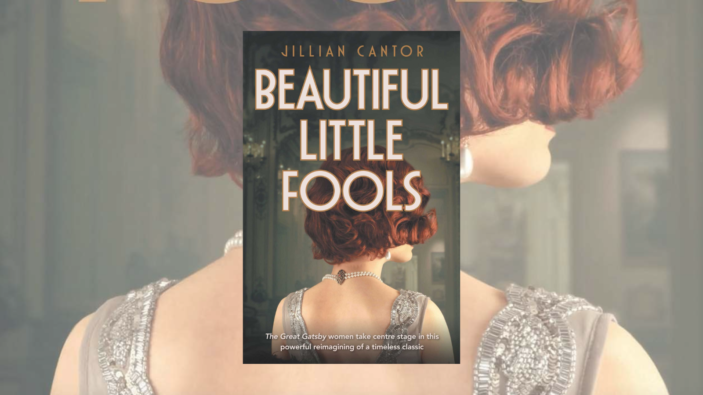
“I hope she’ll be a fool– that’s the best thing a girl can be in this world, a beautiful little fool.”
So says Daisy Buchanan, the glamorous but fickle love interest in F. Scott Fitzgerald‘s classic novel The Great Gatsby. She’s talking about her young daughter, Pamela, who rarely appears on the page in the original text. In fact, none of the women of Fitzgerald’s novel have much depth ascribed to them. Fitzgerald’s Daisy is beautiful but aloof; Myrtle Wilson is trashy and loud; and Jordan Baker seems to have adopted her golf playing as a stand in for a personality.
But the changing place of women in the early twentieth century, and indeed the inner lives of these characters living through the Jazz Age, are front and centre in Jillian Cantor‘s latest novel. Taking its title from Daisy’s offhand comment about her hopes for Pammy’s future, the book is Beautiful Little Fools, but its heroines are anything but.
In the summer of August 1922, playboy billionaire Jay Gatsby is shot dead and left floating in his swimming pool. Local mechanic and recent widower, George Wilson, is blamed for the murder, and seeing as he appears to have shot himself out of grief and guilt in the nearby woods, it should be a closed case.
But, the policeman assigned to the case has found something that throws this explanation into doubt. A diamond hairpin that can only have belonged to one of three women. Daisy Buchanan was once involved with the deceased, but she’s now married to a jealous, philandering polo player. Jordan Baker was a promising golfer until a scandal got her thrown off the tour; she’s also Daisy’s best friend and fiercely protective.
Finally, there’s Catherine McCoy, who claims to have never met Mr Gatsby. Her sister, Myrtle Wilson, was married to Gatsby’s supposed killer, and just one day previously, had been mown down in the street by someone driving Gatsby’s distinctive yellow car. The question at the heart of this novel is not so much who killed Gatsby, but why might each of these women had a good reason to.
Cantor is obviously extremely acquainted with her source material. She breathes life into each of her characters, matching what she invents for them with what Fitzgerald laid out, and giving a sense of depth to each woman’s tragedy. While her interpretation casts the semi-heroic figures of Nick Carraway and Jay Gatsby somewhat aside, she is respectful of the themes and motifs of the American classic.
Instead of contradicting the book, she adds nuance to it, and gives the female characters a chance to defend themselves. It was the strength of the characterisation, and the evocation of a sense of nostalgia for one of my favourite classics which kept me reading, even when the prose strayed a little too close to the side of purple.
In particular, the gifting of a life and a personality to Jordan Baker, who had always felt like something of an afterthought, was a highlight of reading Beautiful Little Fools.
If you like well-plotted, introspective novels about domestic strife, then this one is for you. Though I’d caution you to make sure you’re familiar with The Great Gatsby first. For if this review hasn’t spoiled that one for you, then the novel certainly will.
![]()
![]()
![]()
![]()
![]()
FOUR STARS (OUT OF FIVE)
Beautiful Little Fools by Jillian Cantor is out now from Simon and Schuster. Grab yourself a copy from Booktopia HERE.
